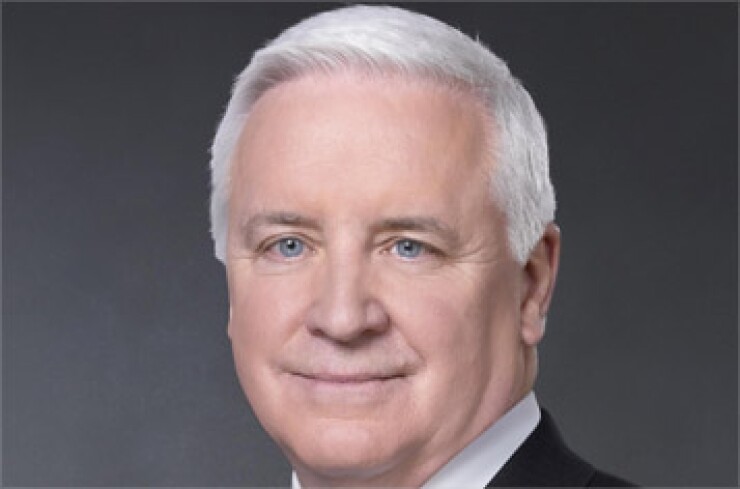
Pennsylvania Gov. Tom Corbett still has a lot of unfinished financial business on his plate, but after lawmakers passed a $2.4 billion transportation bill, he didn't want to hear about it.
"Let us enjoy tonight and then we'll get on to the rest of the agenda," Corbett said at a Thursday night
Moments earlier, the House of Representatives in a 113-85 vote approved a far-reaching bill to fund roads, bridges, mass transit, rail freight, ports and airports over nearly five fiscal years. The Senate passed it 45-7 one day earlier.
The bill had stalled in June and again last week, during the truncated fall session. One contention point was raising the threshold of the "prevailing wage" law to $100,000 from $25,000, although the provision passed along with the bill.
"Those things that are good are sometimes hard to fight for," said Corbett, who is expected to sign the bill early Thanksgiving week. The measure, which will increase the current $6.1 billion transportation budget 39% by 2017-18, includes higher gas taxes and fee and fine hikes to consumers.
Passage of the bill represented a rare legislative victory for Republican Corbett, despite GOP control of the House and Senate. Other initiatives that failed earlier on the year but could be up for discussion by year's end include privatization of the liquor stores and lottery systems, and overhauling the state employees' pension system, which has an estimated $45 billion shortfall.
Intense lobbying over the past week surrounded the transportation bill. Former governors Ed Rendell, Tom Ridge and Mark Schewiker joined Corbett in urging passage as did former state auditor general Jack Wagner and other politicians.
According to David Fiorenza, the transportation bill will have both negative and positive effects in Pennsylvania.
"Car owners will pay more eventually at the pump and for vehicle registration. All businesses will be affected from landscapers using diesel fuel to the smaller independent retail gas owners who have service stations in the commonwealth," said Fiorenza, a Villanova School of Business professor and a former chief financial officer of Radnor Township, Pa. "The capital markets who follow municipal budgets do not always look at tax increases unfavorably if there is a good plan in place to invest in the future of infrastructure and transportation."
Moody's Investors Service rates Pennsylvania's general obligation bonds Aa2. Fitch Ratings and Standard & Poor's assign AA ratings. Fitch and S&P have negative outlooks for the commonwealth, while Moody's assigns stable.
Fitch referenced a "challenged management environment" last month, when Pennsylvania sold $750 million of GO bonds. "The commonwealth had been reducing its structural budget gap as the economy recovered, but progress appears to have stalled and even reversed," the rating company wrote.
Fiorenza urged state lawmakers to look big-picture at transportation funding.
"Although having some good intentions with public transit and repairing bridges, [they] are not reviewing the macroeconomic multiplier effects of increasing excise taxes on the tax voting public. Also, any increase in the oil franchise tax will be passed on, for the most part, to the taxpaying public," he said.
According to Corbett, by the fifth year of the plan, the legislation invests annually an additional $1.3 billion annually for state roads and bridges; up to $495 million for public transportation; $237 million for local roads and bridges; $144 million in a so-called multimodal fund; $30 million for dirt, gravel and low-volume roadways; and $86 million annually for Pennsylvania Turnpike expansion projects.





